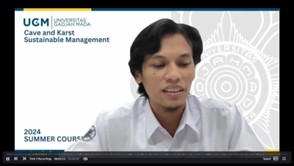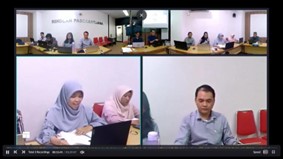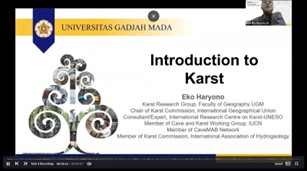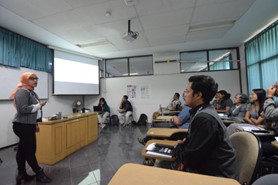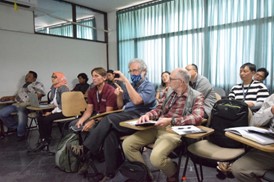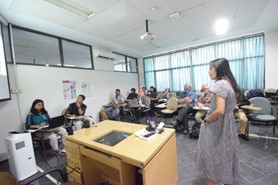
The Master’s and Doctoral Study Program in Environmental Science, Gadjah Mada University Postgraduate School (SPs UGM) is holding a summer course program on 29th July – 8th August 2024 which will be held in a hybrid manner in the SPs UGM unit 1 building. This program will be attended by a total of 64 participants, consisting of 41 international students from various countries such as Malaysia, Thailand, Vietnam, and 23 students from Indonesia. This initiative is in line with the Sustainable Development Goals (SDGs), especially in terms of access to education and cultural diversity.
The summer course with the theme “Summer School on Sustainable Cave and Karst Management” is part of the academic innovation and internationalization grant. This program aims to encourage interdisciplinary excellence in the field of speleology, namely the study of caves and karst landscapes. This program is coordinated by Prof. Dr. Eko Haryono, M.Si from the Postgraduate School, Drs. Hendrie Adji Kusworo, M.Sc., Ph.D from the Faculty of Social and Political Sciences, Dr. Sudaryatno, M.Si from the Faculty of Geography, and Dr. Andung Bayu Sekar Anom, M.Sc. from the Department of Environmental Geography, Faculty of Geography, UGM.
The main objective of this summer course on Speleology is to develop speleology in ASEAN countries through exchanging knowledge between global speleology practitioners, introducing and promoting the uniqueness of Indonesian speleology, and increasing the interest of the global community, especially the ASEAN community, in aspects of speleological science. This initiative not only supports education for sustainability but also emphasizes the importance of cultural heritage and ecological awareness.
“Summer Course Cave and Karst Management 2024 was my first experience. From this course, I was able to learn especially karst management from various aspects & cross-disciplinary areas. Insights became more open when Narsum from various countries conveyed karst management in their regions. “This really supports the understanding & studies that I am currently undertaking,” said Melania Hanie, one of the Environmental Science Study Program students as a summer course participant.
Summer course participants engage in a curriculum designed to provide them with essential competencies. At the end of the program, students are expected to be able to understand the scientific value of caves and karst systems in ASEAN countries, understand the various processes and dynamics that occur in these ecosystems, and appreciate the sustainable development and management of caves and karst. This is in line with the SDGs focus on equal access to education and the promotion of environmentally friendly technologies.
Collaboration between local and international students fosters civil society partnerships, increases cultural diversity and promotes mutual understanding. This exchange of ideas and experiences is vital for developing innovative solutions to the environmental challenges faced by Indonesia and the ASEAN region more broadly.
This summer course program is a significant step towards achieving the SDGs by promoting access to education, encouraging cultural diversity, and increasing global awareness of environmental issues. Collaboration between students and faculty from diverse backgrounds will certainly enrich the learning experience and contribute to sustainable development in the region.
Tags : summer course, karst management, global speleology, environmental issues, SDG 4: quality education, SDG 5: gender equality, SDG 7: clean and affordable energy, SDG 9: industry, innovation and infrastructure, SDG 14: ocean ecosystem, SDG 15: terrestrial ecosystems, SDG 17: partnerships to achieve the goals
Author: Siti Muyasaroh

